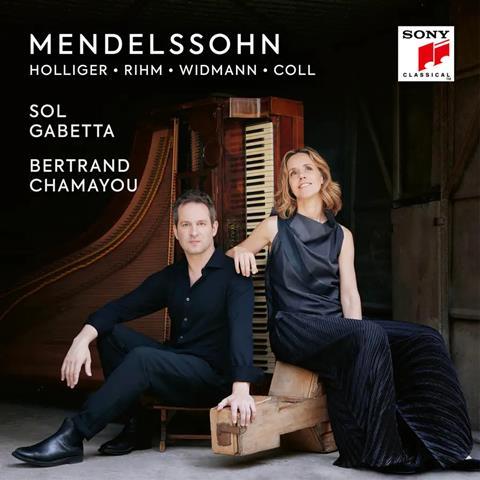Plenty to entice here, as Mendelssohn meets modern masters

The Strad Issue: March 2024
Description: Plenty to entice here, as Mendelssohn meets modern masters
Musicians: Sol Gabetta (cello) Bertrand Chamayou (piano)
Works: Mendelssohn: Cello Sonatas: no.1, no.2; Assai tranquillo; Song without Words; Variations concertantes. Coll: Dialog ohne Wrote. Holliger: Lieder ohne Wrote. Rihm: Lied ohne Worte; Verschwundene Wrote. Widmann: Lied ohne Worte
Catalogue number: SONY CLASSICAL 19439934002 (2 CDs)
You can rely on Sol Gabetta to present central repertoire with seemingly effortless aplomb and bags of personality. And while time spent with Mendelssohn’s two major masterpieces for cello and piano – the Second Sonata and the Variations concertantes – is never time wasted, it’s good to hear the First Sonata played with the same level of passion and involvement.
Gabetta and Bertrand Chamayou have been playing the Second Sonata together for several years and their rapport is evident from these propulsive, responsive performances. She plays the ‘Bonamy Dubrée-Suggia’ Stradivari of 1717 – formerly in the possession not only of the cello goddess Guilhermina Suggia but also of Pablo Casals – strung with steel-wound gut-core strings. This has a less outgoing overall tone than the 1730 Gofriller (conventionally strung) she uses elsewhere in the set, richer at the extremes of the range than in the middle. Chamayou, meanwhile, chooses an 1859 Blüthner, with its telling tonal variance from almost blunt bass to drily clangorous upper treble. The pairing of the two instruments in the hands of these foremost players is an added attraction in the Mendelssohn.
Read: ’There is a tiger inside this instrument’: Sol Gabetta talks about her newly acquired cello
Read: Sol Gabetta: Life Lessons
Watch: Cellist Sol Gabetta performs - and sings - at the Proms 2016
Further attraction is provided by a short second disc presenting works commissioned by Gabetta to muse upon Mendelssohn’s Song without Words. Jörg Widmann’s Lied ohne Worte adopts aspects of Mendelssohn’s language and refracts them through its composer’s own aural lens; Heinz Holliger’s three Lieder ohne Worte employ a panoply of extended techniques and expressive devices for a more alienating sound world. Francisco Coll’s Dialog ohne Worte is sustained and lyrical; and while Wolfgang Rihm’s Lied ohne Worte is more halting, his Verschwundene Worte (‘Vanished Words’) returns to a more diatonically based landscape. It’s a fascinating pendant to the main event, so come for the Mendelssohn but stay for the new works.
DAVID THREASHER











































No comments yet